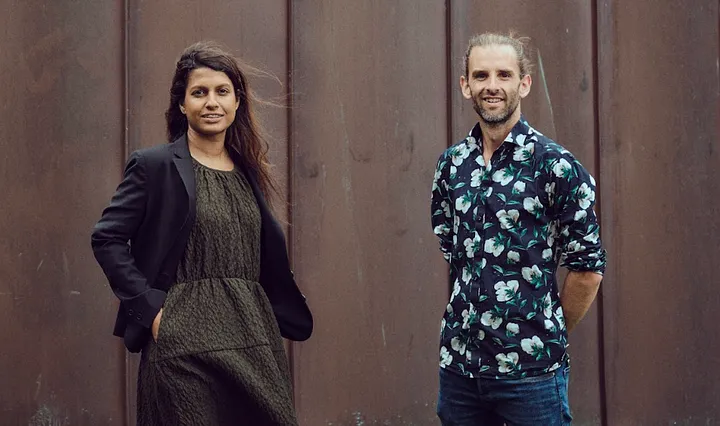
Natural, bio-based colours are becoming increasingly valued in the textile and fashion industries as they offer a sustainable alternative to traditional synthetic dyes, which are derived exclusively from non-renewable petrochemicals and have catastrophic environmental impacts, notably water pollution, high energy consumption and toxic chemical use.
The fashion industry is one of the world’s worst polluters, contributing a staggering 10% of global greenhouse gas emissions, and 20% of global wastewater generation, with the dyeing and finishing process being by far the biggest contributor to these numbers (UNEP).
This is why we’ve invested in the Copenhagen based synthetic biology platform, Octarine Bio that specialises in developing bio-based solutions for new natural ingredients, including bio-based dyes, flavours and high-value bioactives.
Reducing the footprint without compromising on cost or quality
Octarine uses precision fermentation of custom engineered microbes to develop a new colour palette of natural, bio-based and sustainably produced textile dyes. Octarine combines this technology with a proprietary direct-dyeing method that eliminates the use of harmful chemicals and significantly reduces heat, energy and water use. Combined, Octarine provides the textile and fashion industry a way to significantly reduce their environmental footprint without compromising on cost or quality.
Conventional dyeing processes involve multiple stages of water-intensive operations, such as dye dissolution, dye bath preparation, dye application, and rinsing. The discharge of wastewater containing residual dyes and chemical additives also poses a significant environmental concern if not properly treated. It’s frustrating to realize that the textile industry continues to constitute an existential threat to water surfaces due to the discharge of untreated or inadequately treated wastewater containing synthetic dyes. Wastewater from dyeing operations can contain high concentrations of dyes, salts, heavy metals, and other chemicals, which have substantially detrimental effects on aquatic ecosystems when released into water bodies. Furthermore, washing synthetic products has caused more than 14 million tonnes of microplastics to accumulate on the bottom of the oceans (European Parliament).
Furthermore, the textile and garment sectors leave a tremendous carbon footprint of 1.7 billion tonnes in carbon emissions per year (ILO), And with fast fashion never ending production pace, the impact on the environment is becoming increasingly frightening.
The problem doesn’t only rest in the threats posed to aquatic life or the tremendous carbon footprint the textile industry entails, but also in the fact that substances such as formaldehyde, chlorine and heavy metals when disposed of into water bodies are consumed daily by many people.
There is a rising appetite for sustainable eco-friendly products among consumers worldwide, and the use of bio-based colors can help fashion brands meet these demands and contribute to a more sustainable fashion industry.
The market dynamics in Octarine’s favour
In 2022, the global market for textile dyes was valued at approximately US$6.5 billion. According to projections, it is expected to reach a size of US$11.2 billion by 2030, growing at a compound annual growth rate (CAGR) of 7% over (2022–2030) (Research and Markets). The Natural Dyes Market, specifically, is estimated to reach a size of US$4.5 billion by 2027 and is projected to grow at a CAGR of 8.6% from 2022 to 2027. (IndustryARC). Natural dyes are derived from natural sources and are commonly used in the textile industry, which holds the largest share in the Natural Dyes Market (Grand view Research).
In addition, with the EU’s mission to achieve a circular economy by 2050 and newly introduced legislation to limit the use of harmful chemicals in consumer products, most notably banning the use of many common synthetic dyes, the legal landscape is drastically changing to encourage the textile and fashion industries to embrace eco-friendly practices. Starting from 2024, European companies will also need to apply the rules stipulated by the EU’s new Corporate Sustainability Reporting Directive. And by 2025, the EU’s member states must collect textiles separately under the waste directive that the Parliament passed in 2018. Producers will be accountable for their products throughout the value chain, including when they end up in waste.
Octarine Bio, founded in 2018, is a Synthetic Biology platform company with a mission to transform and re-design products and processes with sustainable, bio-based, and innovative solutions that provide radical changes to the world’s most pressing issues. Octarine’s core program focuses on developing a new class of bio-based colorants to improve the environmental footprint of the textiles industry.
Using a proprietary fermentation-based manufacturing platform, Octarine produces a range of natural dyes in difficult to source colours with significantly reduced environmental impact, and further, through an innovative dyeing process, efficiently dyes a range of natural and synthetic fabrics directly without the use of mordants or other harmful chemical additives.
How we knew Octarine & Unconventional Ventures were a good match
“The textile industry must switch to a more aggressive decarbonization trajectory in order to reduce its contribution to GHG emissions, water pollution and, ultimately, climate change. Octarine’s groundbreaking technology leads the way in transitioning the industry towards sustainable practices and away from harmful synthetic dyes. With Nethaji’s and Nick’s expertise, execution power and visionary leadership, we are confident they will make a lasting impact on the fashion industry, making us a proud backer of Octarine,” comments Thea Messel, Founder and General Partner at Unconventional Ventures.
“The textile industry is of huge global importance, providing high levels of employment, foreign exchange revenue and products essential to human welfare. The world is producing and consuming more textiles than ever before and the Global demand for clothing looks set to increase significantly over the coming decade, it is not surprising that there is now a growing push to improve the safety and sustainability of the dyes used in them. We are at the forefront of this movement but revolutionizing such a massive industry does not come easy. That’s why we are delighted to have the support and investment from Unconventional Ventures. Their experience in funding climate and environment solutions is invaluable to us. Together, we are confident that we can deliver the positive impacts that our technology promises.” Netahji Gallage, CEO and Co-Founder Octarine.
Source
Unconventional Ventures, press release, 2024-04-14.
Supplier
European Parliament
European Union
Grand View Research
ILO International Labour Organization - Germany
Octarine Bio
Research and Markets
Unconventional Ventures
United Nations Environment Programme (UNEP)
Share
Renewable Carbon News – Daily Newsletter
Subscribe to our daily email newsletter – the world's leading newsletter on renewable materials and chemicals









